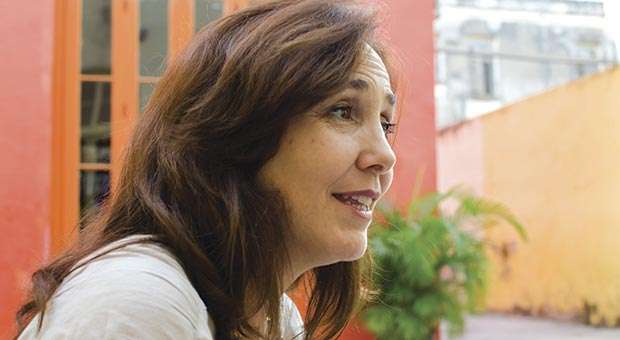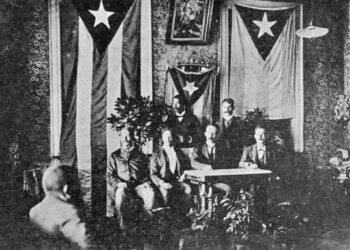Interview with Mariela Castro
The idea of interviewing her came up between songs, knowing that she loves the trova genre and that it is advisable to address a woman of such fearless ideas—and actions—poetically. Here are a few of our moments with Mariela Castro Espín, a woman from a historic family who, as director of the National Center for Sex Education (CENESEX), is proposing important changes for Cuban society.
“On any given morning I wake up, still alive/ and my thumb skims over you, I untie your hair with pleasure/ and then I say looking without looking: you are woman…” Silvio Rodríguez says it in a song, what does it mean to be a woman?
Being a woman is a wonderful identity, a challenge. You wake up every day with the lessons that you have drawn from life, because not everything gives you that; you have to draw it out, built it, elaborate it, discover…and discovering yourself as a woman every day is fascinating. It is a challenge, because the history of women has featuread a lot of discrimination and because men still have to learn how to coexist with women, not just as their romantic partners, but also as comrades, as friends, as mother, sister, daughter, leader, because everything that was invented to disqualify women and to get them out of the way still weighs on us.
“Eve goes out in heat to hunt/ Eve goes out to find the seed./
Eve goes out and soars in flight…”
And Silvio returns to the Biblical character, but liberating it from that secondary, subordinate role, that has been used to oppress it. Is Eve a rib no more?
Of course. Eve is resisting that imposition, which even condemned her to death at the stake for being a heretic. Eve has been a heretic since she was conceived; Eve is a rebel, and a woman’s identity always has that element of being a rebel, of trying to change the rules.
“They loved the serene love of nocturnal beaches/ raised their skirts and happily moon-loved each other/ in that city so empty of moon sparkle…” Now it is Chico Buarque who is describing the romance between two girls who end up turning into fish, algae…melting into the water because of what is called “forbidden love.” Is today’s world ready to publicly receive a love like that?
The world is never ready for change; that is why it must be provoked, you have to do something, you have to dare, to be able to change the rules. So that everyone, all of us, can have a decent space, we have to be daring; and there are many ways to do so, some more dangerous than others, some more romantic, some more scientific. But if we do not dare, the conditions are not created for change to happen. That is why to be a woman is also to be revolution.
“It is not your April body that you sell/ it is not your body, my love, what they pay for/ it is the time of being beside you/ it is the time of existence that vanishes…” This excerpt from the book El Diablo Ilustrado refers to the buying and selling of sex, something that many in today’s world view as natural, and that is justified with expression such as “prostitution is humanity’s oldest profession….”
Whenever I hear that expression it really bothers me. My answer is that humanity’s oldest profession is the unbridled exercise of power, and that is when we human beings became commodities, selling sexual services and being turned into commodities in every sense of the word. We have to pay attention to our focus when we talk about social problems associated with prostitution. We have to think about people who are being exploited and abused, and who have not found a way out of certain circumstances in their lives. I always say that when we talk about these issues we shouldn’t do so in a moralistic way, because we aren’t helping anybody. We need to address it from the standpoint of a human being’s freedom. When you become a sexual commodity, you come under the law of supply and demand; you have to subordinate yourself to what they pay you, and you lose all of your freedoms and rights. I think we have to call upon those people to reflect, to make their own decisions; these things cannot be imposed. The wisdom of freedom cannot be imposed; it has to be discovered.
“Two souls,/ two bodies,/ two men who love each other/ are going to be expelled from the paradise that was their destiny./ We are not God./ Let’s not be wrong again…” says Pablo Milanes in a song. In Cuba, a country with a sexist tradition, relationships between men have been very much frowned upon, in fact it could be said that they are less tolerated than love between women… Will a formal wedding between two people of the same gender ever be accepted as something natural?
I think so. Eventually we will view it naturally, and the Cuban Family Code and other laws need to include it. Cuban society is advancing along with the world, even though our society is quite sexist and homophobic, something that was left to us by our dominating ancestors. Changing that mentality takes time. Fifty years of Revolution are not sufficient for that change, but it is a valuable journey of searching based on an emancipating project, a project of human freedom. Naturally, over the course of that journey errors are made, prejudices are repeated, and different forms of the dominating model that we have to overcome are reintroduced. I say we need to look at what it is we want for each one of us, for each one of our children, and then search for the codes that an emancipated society needs. We have been able to do this for many other things, but this is still needed; homophobia was a pending issue for the Revolution.
“A gentleman would like to be a woman/ and a girl wants to be a gentlman./ Even God, who is power, dreams…” We continue with Silvio and these verses that describe people who are unhappy with how they were born; in Cuba sex-change operations have been performed. How is society responding to transexuality?
In 1979 the first person turned up, a worker from Matanzas who felt like a man and had been born female. That was when the Federation of Cuban Women began to search for information, with the support of the Ministry of Health. I think that the debate that has been generated in Cuba around this issue has been very useful. What has encountered more resistance, a lot of resistance, is same-sex marriage, and the adoption of children by same-sex couples; people think that is crazy, as if maternity and paternity were a gift from nature. They are a gift from culture, something that we learn. And all of us, heterosexual persons and same-sex couples, have to learn how to be mothers and fathers. We learn every day and we make mistakes. I know that these are all proposals that we have to make little by little so that people accept these changes, but why can we heterosexual couples have the privilege of starting families and raising our sons and daughters, while same-sex couples can’t?
“Some say here, others say there/ and I just want to say, I just want to sing/ and it doesn’t matter what fate can befall a song…” Silvio says in other heretical verses. Daughter of Vilma and Raúl, niece of Fidel…. When Mariela Castro Espín issues any opinion that breaks with social canons, it causes a huge stir: some might say that her opinion was previously consulted and is therefore official, “from above,” while others might speculate about differences between daughter and father, approaching it like a conflict of generations within the Revolution….
I’ve lived with that situation all of my life, since I was a child, and I’ve learned how to carry that load, which on the one hand has some very beautiful aspects, and on the other, disagreeable ones. When you say what you think you are taking on a major responsibility. I try to have a good basis for my ideas, to be humble, and to have the ability to listen, because when you listen, you learn. I am very proud of my family, my father, my mother, my uncle…. I learned from a very young age that he was not my uncle; he was Fidel, and therefore I took a distance very quickly, and I have always viewed him with that respect and admiration that all of us feel who identify with his revolutionary example and with his virtues and defects, which, fortunately he has, because he is not a god, he is a human being.
I feel proud of my family but it also bothers me when they are used to create an obstacle for me, to put me in check. My family connection cannot be a burden that crushes me; on the contrary, it should be something that uplifts me. Of course discrepancies exist. What family doesn’t have them? We might agree on a project, but not agree on every aspect, or on how it should be done. But that does not mean that a generational conflict exists. I think that discrepancies generate development. That’s why you have to be brave and raise different viewpoints even if that creates a major problem for you. Even though it has been difficult for me, even though sometimes I’ve become furious, even though sometimes we’ve even stopped speaking to each other, and things that you can’t even imagine…we love each other and need each other, and we search for the right moment to reconcile again and refine our viewpoints, or not talk about those viewpoints that don’t help us to understand each other. Because I’m a representative in the National Assembly now, my dad said to me: well, now you’re in the Assembly; don’t bring up any more problems to me on Sundays, say whatever you want in the Assembly. And it’s true. Being a representative is something that I’m enjoying; it allows me to release a whole ton of concerns and proposals that I’m working on, like many other representatives who are assuming the responsibility that we’ve been given.
As a final provocation, Silvio Rodríguez: “The sun doesn’t come out these days, without your face./And in the deaf, silence of time, your eyes shout./… O! of all the things that swell this moment./ O! of these terrible days, murderers of the world.”
I’m speechless. I love that song and I’ve been singing it since I was a teenager. That song says so much to me…these are very painful days; we are not free of rage, but these difficult days have us thinking, looking back at the past and at the future…thinking about how not to lose our direction (which is the south, in our case), not to lose the principles that have inspired us and other generations. I’m not afraid of these complex times, they have me very alert. You can look at the new times and say to yourself, they’re terrifying, but then suddenly you begin to see the dawning of people, situations, messages, ideas, things that surprise you. So then you say to yourself: how wonderful! How delightful we human beings are, capable of finding the perfect word, the necessary project, the initiative, in the middle of these situations that make us profoundly sad…the thing is, we continue to take risks. And I love that risk.










